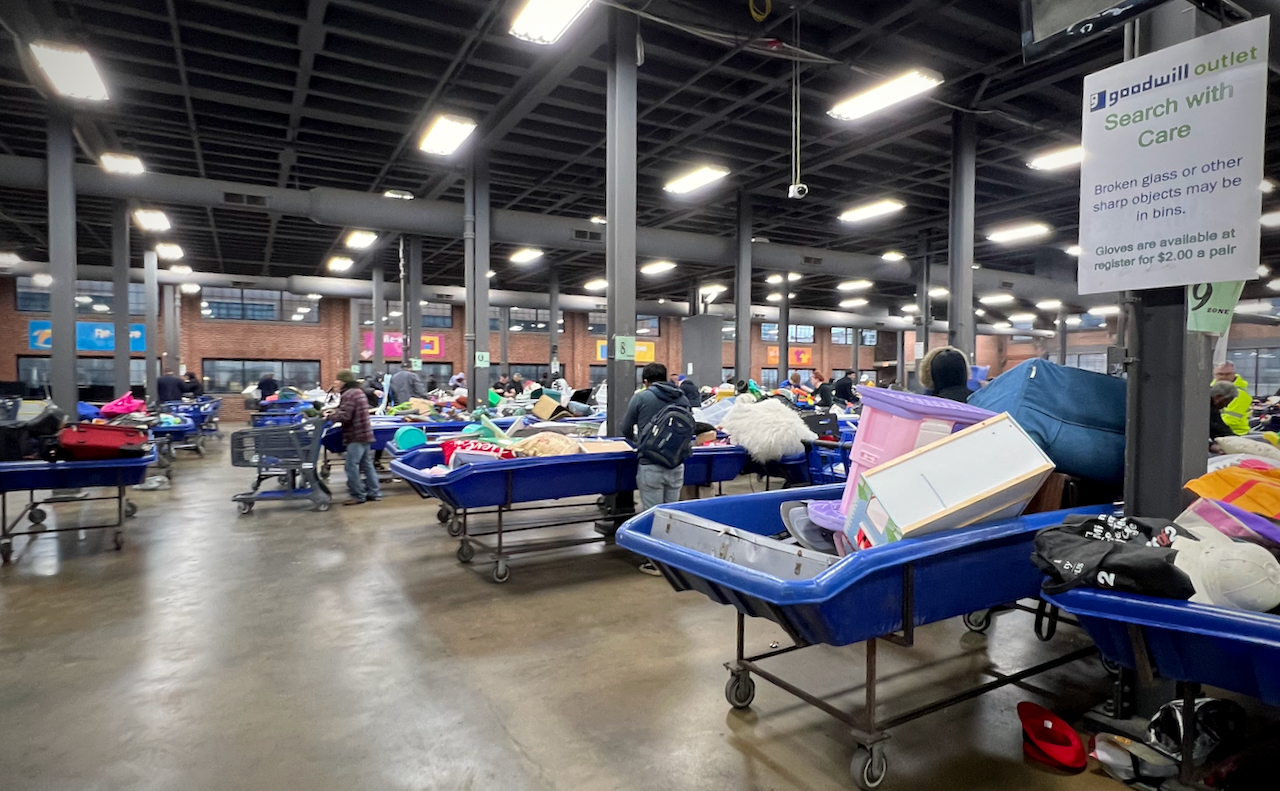
Goodwill Outlet of St. Louis (Photo by John Griswold)
My younger son wanted to visit the Goodwill Outlet in the city before he goes back to school. He convinced me to drive by saying they would have wall mirrors, which I collect from Facebook Marketplace, and even possibly a chair. He wanted to look for thrifted clothing. Teens love washed-out dad jeans and other clothes we used to get made fun-of for. Now, I am told, we have serious drip.
The Outlet is a warehouse-sized building, like an old postal-sorting facility, under two layers of gritty interstates. The rain was cold, the roads bad, and I could not be sure a sleeping bag a foot from the highway did not have a body in it. Chain-link and barbed wire fenced the parking lot which looked like a place to avoid if you had downgraded the insurance on your aging car to liability only.
Inside, the facility was clean, well-lighted, and warm. Rather than racks of clothes on hangars and shelves stacked with home items—as the Goodwill in my town has—there were hundreds of man-sized plastic bins lined up in dozens of rows. The majority held tangles of secondhand clothes. Others contained jumbles of old picture frames, discarded electronics, toys, lamps, threadbare sleeping bags, notebooks with the first pages torn out, pieces of metal, and so on. Signs warned to be careful because the bins might contain broken glass.
Dozens of people dug seriously in the bins, turning stuff over with both hands. A few glared when I got too close to see what they were working on. Most, my son thought, were re-sellers, picking for income from sites such as Depop. An elderly woman looked unhoused, but teenagers scattered through the place were laughing, exclaiming, teasing each other, and taking selfies, and it was impossible to be sure of anyone’s situation.
A serious middle-aged man with Kevlar gloves passed with two cheap metal detectors and a well-used bread maker in a cart. A family speaking an Asian language stood in line to pay for a dining table and chairs they had piled on a hand truck. Those were the best finds I saw. After a time the bin contents blurred into a single substance the color of meat hash. I grew up with food insecurity and unlivable housing, and the deep misery of poverty is always accessible to me.
My son was happy to find one T-shirt embroidered with the Pink Panther playing golf and another that had Chevelles and paint smears on it, like something a friend wore in the ’80s. I decided to buy a heavy, like-new pullover and was ready to go, until I saw three rows of bins of books in a far corner.
Going out is always an opportunity to learn, but I also often have odd moments in new places “when the personal seems to infect the objective,” as I once wrote about unexpectedly finding connections, in an impossible place, to my past as a military diver. Now, amid the old textbooks, romance novels, Bibles, and diet cookbooks, I found a slim book titled One Man’s War: Diving as a Guest of the Emperor 1942,” by U.S. Navy Master Diver Robert Sheats. The book is rare, and what it was doing in a plastic bin in the Goodwill in St. Louis I do not know.
One Man’s War is Sheat’s story of surviving as a prisoner of the Japanese in WWII, being forced to dive in dangerous conditions with inadequate gear for their navy in the Philippines, then being used as slave labor in a mine on the Japanese mainland. Sheats and his comrades were starved, beaten, subjected to weather, and left to die by the thousands from disease and overcrowding. Fifty-six years after the events in his book he still uses racial epithets but also defends the behavior of Japanese he witnessed in an attempt to get our story right. He has the wisdom to apply his personal experience to life and quotes Viktor Frankl, “[T]o survive is to find meaning,” but insists that survival comes from self-knowledge and self-respect.
It was the right book to find in that place, at this point in our history, and that night I read it all in one go.
The Goodwill Outlet of St. Louis, if you would like to visit, charges $1.85 per pound for most things in the facility. They have a scale to weigh your discoveries at the register. The value of their books is determined by the spine-inch.
